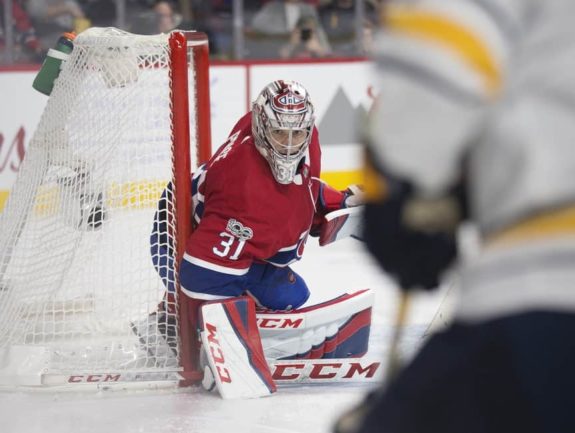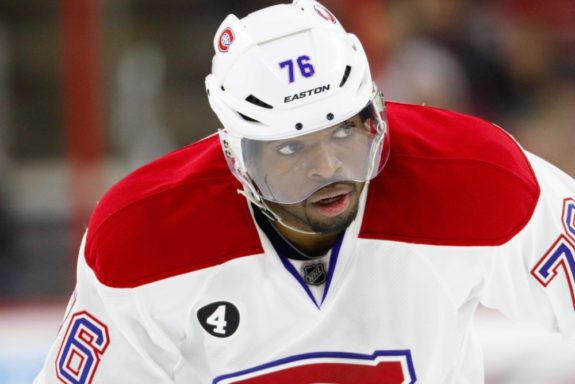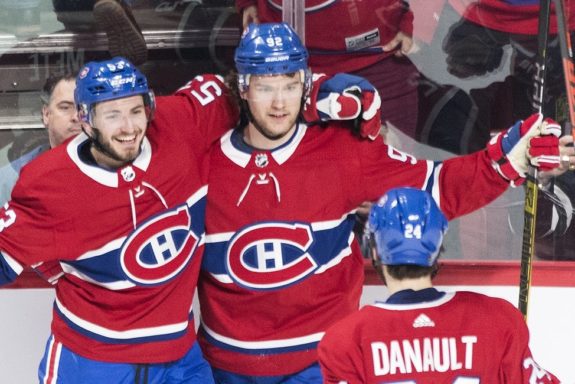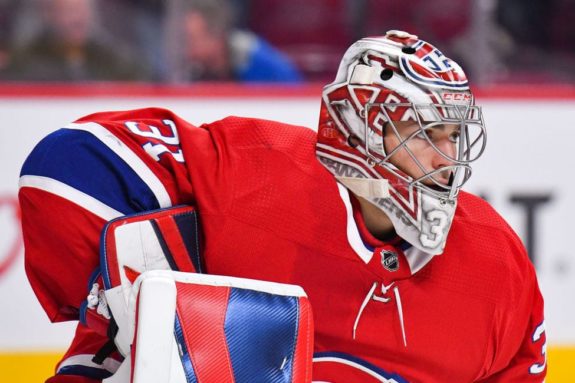Of course, the Montreal Canadiens could use help up front, but the misguided notion they suddenly need a game-breaking talent is a slap in the face to goalie Carey Price.

Or even Shea Weber. Hell, even as Florida Panthers forward Aleksander Barkov was lighting up the Habs the other night with a hat trick in what ended up a 6-3 loss for the Canadiens, their own Max Domi notched two goals of his own.
Canadiens Already Have Elite Talent
Now, this isn’t a suggestion that Domi is in any way on the same level as Barkov, but it is a call for widespread sanity in response to any argument suggesting the Habs lack elite talent. They don’t. And, with the Panthers well out of a playoff spot, eliminated for all intents and purposes two thirds through the season, maybe, just maybe, singular superstar talent on its own is overrated.
For a while, the Canadiens had the best goaltender on the planet in Price and it didn’t do them a whole lot of good either. Since the 2010 playoff run, during which Jaroslav Halak stole the show, Price has been out of the first round exactly two times… and that was when he was at the top of his game.
Maybe that’s an argument that a superstar talent up front could have made a difference. However, in 2014, when the Canadiens reached the Eastern Conference Final, the Habs had the disappointing Thomas Vanek, remember. They also had the ever-polarizing P.K. Subban, who, like him or not, is one of those rare players who can take over a game on his own, as he proved time and again during those playoffs with 14 points in 17 played. He also led them in scoring the next spring, when they lost in Round 2 to the Tampa Bay Lightning.

As an added bonus example, the Canadiens had the benefit of Alexei Kovalev during Price’s 2007-08 rookie season. Call Kovalev the perfect example of an enigmatic Russian if you want, but he was also popularly known as one of the highest-skilled players in the game at the time, and that season was one in which he consistently showed it with 84 points. He also had a good playoff run, with 11 points in the 12 games the Habs got in, before they bowed out to the Philadelphia Flyers.
Pittsburgh Penguins vs. Detroit Red Wings
In spite of the Northeast Division regular-season title, the Canadiens simply ran into a better team. Granted, the Flyers immediately got dispatched by the Pittsburgh Penguins, who had the benefit of Sidney Crosby and Evgeni Malkin up front. The Penguins ultimately lost, though, to the Detroit Red Wings, who, in spite of their own star power, were clearly more of a complete team.
Compare and contrast, if you wish. The Penguins had Crosby, Malkin and exactly two top scorers in their primes: Marian Hossa and Ryan Malone. Their sixth-leading scorer in the playoffs was Maxime Talbot. The Red Wings had Henrik Zetterberg, Pavel Datsyuk, Johan Franzen and Niklas Kronwall not to mention Nicklas Lidstrom exiting his.
By the time the next season rolled around, the Penguins didn’t just have the benefit of one more year of experience on the part of their two-headed monster down the middle, but more depth overall. That’s what helped them beat the Red Wings finally, not a single player. The fact that one of those heads (Malkin) was still on his entry-level deal, certainly helped too.
What About Drouin?
Now, as alluded to earlier, Price has been that single player for the Canadiens far too often that it should be clear by now: Goaltending alone doesn’t win games. Well-built teams do. So, unless general manager Marc Bergevin can somehow acquire a superstar talent to fill the hole on the left side on defense the Habs will fail to gain much traction in the standings or towards the long-term goal of winning the Stanley Cup.
Just for kicks, keep in mind that’s a hole that was left wide open by the trade that sent Mikhail Sergachev to the Tampa Bay Lightning for Jonathan Drouin. Drouin is of course another supposed game-breaker, in the mold of Kovalev (albeit due in large part to Kovalev’s propensity to disappear from game to game). He’s nevertheless a top-line talent, one who was literally drafted right after Barkov at No. 3 overall in 2013.

The truth of the matter is undeniable, when you stop to think about it. The Canadiens aren’t lacking in elite talent. They’re lacking depth at certain critical positions. It’s certainly been proven time and again that maybe having more of that talent up front instead of invested in net would be more beneficial. However, at this juncture, signed long term, Price isn’t going anywhere and neither is Weber.
Even though the Canadiens have a significant amount of cap space, Bergevin nevertheless has to be cautious. Signing top-end talent via free agency or trading for players with term left on their contracts would cut into his ability to sign players like Jesperi Kotkaniemi and Domi in just a few short years. Meanwhile, acquiring rentals at this year’s trade deadline opens up another can of worms, and not just because Bergevin said he wouldn’t.
Price Proves There Is No Quick Fix
There really is no quick fix here. If the Canadiens really want to emulate the likes of the Red Wings and Penguins, it’s a matter of drafting and, above all else, patience. As Price proves, there is such a thing as home-grown game-breaking talent, but winning is a full-team affair that extends to the front office. Bergevin has shown over the course of this season, dating back to last summer, that everyone may be on the same page at long last.

There may not be such a thing as too much talent, but, with the salary cap, there is on an NHL roster. As a result, in part because of the position he plays, there can literally only be one Price. The cost of wrongly assuming the Canadiens are just another one away, elsewhere in the lineup, from becoming a Stanley Cup-caliber team can potentially be back instead of game-breaking.